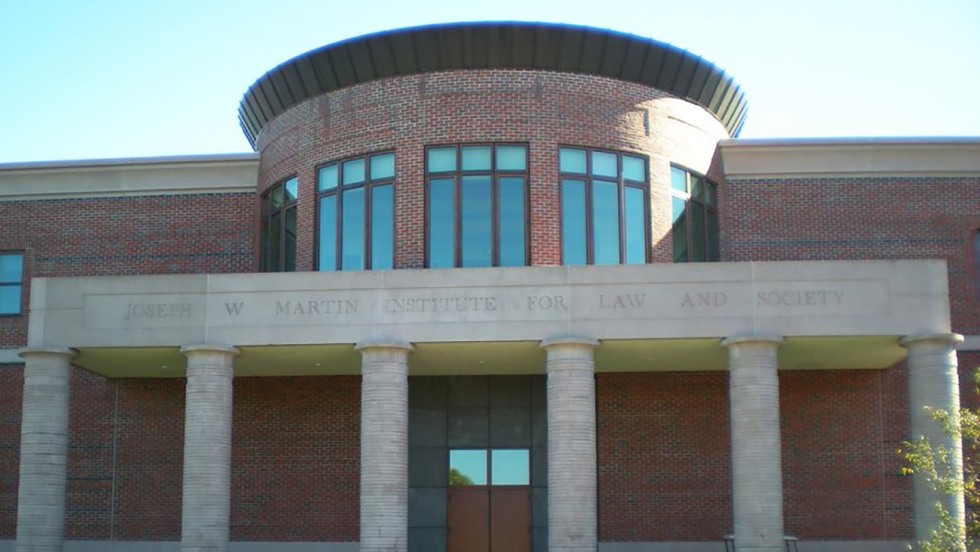Why Major in Criminology?
If you have the desire to serve others, and if building a base of knowledge about the practices of law, the criminal justice system, and the causes and consequences of crime sounds right to you, then consider majoring in criminology at Stonehill.
Ranked No. 4 nationally and No. 1 in Massachusetts on College Factual's list of the best U.S. college programs in criminology, the criminology major at Stonehill gives students an understanding of the theory and practices of the criminal justice system, the social sciences, research methodology and law, while focusing on important issues such as victims, juveniles, social justice and race.
The Beauty of Liberal Arts
At Stonehill, we believe a holistic approach to education, one that’s guided by the principles of education and faith, is the best way to prepare our students for the “real world”. Stonehill students grow into global citizens who value knowledge, integrity and compassion as they seek to create a more just society.
Stonehill criminology majors learn to think critically and analyze information effectively. By studying major and non-major courses, they develop and strengthen their minds to think within and across a variety of disciplines – a skill that will serve them over their lifetimes.
Why Major in Criminology? Here’s Why.
Majoring in criminology opens the door to a wide range of career options.
The Criminology program not only prepares students for typical positions in policing, the courts and corrections, it also provides a broader platform on crime and justice, which opens up opportunities in private and non-profit organizations as well as graduate and law school.
Criminology majors:
- Build relationships with faculty mentors. Learn from professors who are actively engaged in criminology and provide top-notch advising
- Choose from a wide-range of course offerings. Explore different facets of criminology, sociology and anthropology
- Sharpen your skills. Hone your writing, public speaking and critical thinking skills throughout the program
- Tailor your experience. Follow your interests and take advantage of opportunities for student-facilitated research, challenging internships and community-based learning experiences
- Become qualified. Graduate knowing that you are qualified to enter a variety of postgraduate opportunities
The valuable life lessons and skills I learned from the faculty at Stonehill extend beyond the classroom. I learned to think critically, work collaboratively with faculty and other students, and how to translate classroom knowledge into real-world applications.
Tailor Your Experience
The beauty of Stonehill’s low student-teacher ratio is that it allows for individualized attention in the classroom and opportunities to collaborate in the field. The Sociology & Criminology Department offers students a range of internship, community-based learning and practicum opportunities.
Directed Study
Our flexible curriculum allows students to collaborate with trusted faculty members to develop a Directed Study for academic credit. Directed Study is a chance to complete an in-depth investigation closely guided by a faculty member who shares similar interests.
Internship Opportunities
Places where Stonehill Sociology & Criminology Department students have recently interned include:
- Brockton District Court, Office of Probation
- Brockton Early Childhood Intervention
- Brockton Hospital
- Brockton Police Department
- Clean Harbors
- Coalition for Social Justice
- Community Resources for Justice, Boston
- Drug Enforcement Administration
- East Bridgewater Police Department
- High Point Treatment Center
- Horizons for Homeless Children
- Interfaith Social Services
- INTERPOL
- Massachusetts Attorney General’s Office
- Massachusetts Commission Against Discrimination
- Massachusetts Department of Children and Families
- Massachusetts Department of Correction
- Massachusetts Department of Youth Services
- Massachusetts State Police Crime Lab
- MassEquality
- My Brother’s Keeper
- Old Colony YMCA
- Plymouth County District Attorney’s Office
- Reservitz & McCluskey Law Offices
- Riverside Community Care
- School on Wheels
- South Bay Mental Health
- South Elementary School, Stoughton
- The Counseling & Psychotherapy Center
- The Champion Plan
- The Key program
- The Lynch Foundation
- U.S. Marshals Service
- U.S. Probation and Pretrial Services
- U.S. Secret Service
- Washington, D.C. Metropolitan Police
- Women’s Place Crisis Center
Practicum and Community-Based Learning Opportunities
In addition to internships, students have opportunities to learn and work in the field through either community-based learning (CBL) classes or a practicum. These classes get students into the community either through meeting with various groups, mentoring, research, volunteering or some other kind of joint activity.
Practicums combine traditional learning strategies with several hours a week of community-based learning in the field, usually working in a social service or criminal justice agency.
Community-Based Learning allows students to perform service-learning projects or conduct community-based research that not only benefits local needs but is designed collaboratively between community-based organizations as well as faculty and students.
Recent Examples of CBL Classes and Practicums
- Juvenile Justice – Professors Danielle Carkin-Lacorazza and Ed Jacoubs
- Practicum: Victims in the Courtroom – Professor Katie Currul-Dykeman
- Seminar: At-Risk Families and Youth – Ed Jacoubs
- Learning Community: America’s Promise – Professors Corey Dolgon and Ed Jacoubs
Research Opportunities
As a major in criminology, you’ll have the opportunity to do undergraduate and independent research.
Independent Research is an opportunity for students to expand on Stonehill’s curriculum. A student who wants to do his or her own self-directed research, with helpful guidance from a faculty member when needed, generally pursues an Independent Research project. Student-led and –designed, these projects earn academic credit, can last a semester or more, and often help students to define their postgraduate interests and future goals.
The Stonehill Undergraduate Research Experience (SURE) program is an opportunity for students who have completed their first year at Stonehill to perform significant, publishable full-time research under the guidance of and in collaboration with an experienced faculty researcher.
SURE projects help students define and solidify career choices and provide a competitive advantage when applying to graduate school. Many participants also go on to co-publish results in professional journals or present research conclusions at regional and national conferences.
Our programs are distinctive for the range of available opportunities, within and across disciplines, to complete in-depth inquiry in the social sciences, natural sciences and the humanities.
Recent SURE projects
- Keelan Hynes ’20, Renee Radavich ‘20,and Jadaiya Stanley ’20 worked with Professor Anamika Twyman-Ghoshal on the Contemporary Maritime Piracy Database Extension Project.
- Molly Parent ’20 worked with Professor Anamika Twyman-Ghoshal on Analysis of Somali Maritime Piracy Legal Cases.
- Robert Giannelli ‘20 and Rebecca Merkel ‘19 worked with Professor Anamika Twyman-Ghoshal on Contemporary Maritime Piracy—Understanding Highest Piracy Incidence Countries.
In addition to SURE, faculty work with students to conduct research in other types of projects. This might include working with faculty on their own research, but also includes the work students do on their own research projects and on their thesis projects.
Sociology & Criminology Department Faculty/Student Research Projects
- Sam Neil ’20 worked with Professor Pam Kelley on the Drug Free Communities Grant 2019 survey analysis and the implementation of the Critical Incident Management System in Middlesex County.
- Kateri Collins ’19 worked with Professor Pam Kelley on the implementation of the Critical Incident Management System and analysis of Plymouth County Outreach activity.
- Michaela Kewley ’19 collaborated with Professor Anamika Twyman-Ghoshal on Pathways of Women into Terrorism.
- Chase LeMay ’19 did research with Professor Anamika Twyman-Ghoshal on The Russian Annexation of Crimea: An international crime?
- Ryan Murphy ’18 worked with Professor Anamika Twyman-Ghoshal on Examining the Deterrent Effect of Federal Hate Crime Statutes.
- Cameron Burke ’17 worked with Professor Twyman-Ghoshal on Examining the Presence and Potential of Restorative Justice in Serbia in Cases of Discrimination.
- Cameron Burke ’17 collaborated with Professor Anamika Twyman-Ghoshal on Who are the Most Influential Criminologists in American Criminology?
- Katie Wahrer ’17 worked with Professor Anamika Twyman-Ghoshal on Human Trafficking in Serbia.
- Kelli Brodbeck ‘14 conducted her senior thesis in applied sociology with Professor Chris Wetzel on Patrolling Borders: Symbolic Boundaries and the Culture of Campus Policing.
- Nicole Zolli ’14 worked with Professor Anamika Twyman-Ghoshal on Analyzing Forced Labor Prosecutions in the United States.

